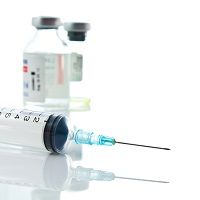What Do Pediatricians Really Talk about When Discussing HPV Vaccination with Parents?
Pediatricians' approach to discussing and recommending HPV vaccination with parents and adolescents varies widely, and can have a significant impact on parents' decision to vaccinate.

The CDC Advisory Committee on Vaccination Practices (ACIP) recommends routine human papillomavirus (HPV) vaccination for females and males at age 11-12. Although vaccination has been shown to effectively prevent HPV infection, and pediatricians report they recommend to parents that eligible children should be vaccinated, US HPV vaccination rates remain suboptimal.
During her presentation at IDWeek 2014, titled “An Investigation of the Recommendation Styles and Same-Day Vaccination Rates for Pediatricians Discussing HPV Vaccine with Adolescent Patients & Their Caregivers,” Liana R. Clark, MD, MS, with Global Health & Medical Affairs, Merck Vaccines, discussed this state of affairs and noted that there are several factors that come into play when clinicians and parents discuss HPV vaccination for children.
She said studies have shown that pediatricians vary their recommendations based on patient age and gender, and report encountering “significant parental barriers to acceptance of their routine HPV vaccine recommendations.” However, parents, for their part, report “a very high likelihood of accepting their provider’s recommendation for HPV vaccination,” said Clark.
If pediatricians are routinely recommending HPV vaccination for eligible children, and parents say they are highly receptive to accepting those recommendations, and yet vaccination rates are not where they should be, then perhaps there is something about the content or form of those conversations that is leading to these outcomes.
To find out, Clark and colleagues conducted a study to assess pediatrician conversations and recommendations for HPV vaccination of eligible male and female patients and analyze the effect of those conversations on rates of same-day vaccination.
For the study, researchers recorded well visit interactions over a period of six months between a panel of 20 pediatricians (14 male and 6 female, with 21 years in practice on average) and male patients aged 11-18 and female patients aged 11-12. No participants were aware of the purpose of the study, and all participants provided consent.
The study covered a total of 204 well visits (159 with males and 45 with females). HPV vaccine was mentioned at some point during 152 visits (78 for males age 13-18, 42 for males age 11-12, and 32 for females age 11-12). Vaccination of any kind was mentioned during 167 visits.
Clark said the HPV discussions were organized into three groups based on the pediatrician’s initial approach to vaccine discussion. During “routine recommendations” HPV vaccine was addressed in the same manner as other routine adolescent vaccines. During “detailed HPV conversations” (or what Clark referred to as “putting HPV in a special chair), clinicians discussed HPV vaccines in greater detail than other adolescent vaccines. During “brief mention” conversations, clinicians merely mentioned HPV vaccine without offering any recommendations or guidance.
Clark said the majority of conversations fell into the “detailed HPV conversation” category, occurring during 66% of visits with females age 11-12, 64% of visits with males age 11-12, and 77% of visits with males age 13-18. The numbers for “brief mentions” were 19%, 29%, and 13%, respectively. “routine recommendations” were made during 15%, 7%, and 10% of visits, respectively. Interestingly, “routine recommendation” conversations were by far associated with the largest percentage of same-day vaccinations.
Clark provided several excerpts of conversations that were recorded during well visits that illustrated the gap between what pediatricians think they are telling parents and patients, and what they actually are telling them. The transcripts showed clinicians who were hesitant, who talked around the topic, and who were either not clear in their recommendations or put the onus on the parent to decide.
Whereas the ACIP recommends vaccination at age 11-12, many participating pediatricians gave the impression that parents could wait until the child was older before vaccinating. Whereas the ACIP calls for clinicians to provide strong recommendations in favor of vaccination and to not miss an opportunity to vaccinate, the transcripts revealed pediatricians who left decisions up to the caregiver and did not convey a sense of urgency in terms of same-day vaccination.
In her summary of the study results, Clark noted that pediatricians are quite varied in terms of their approach to discussing and recommending HPV vaccination. She said the “routine recommendation” approach “was least used by pediatricians in this study, but was the most effective among this sample of pediatricians and patients in achieving same-day HPV vaccination.”
Pediatricians who used the “detailed HPV conversations” approach were less successful in terms of same-day vaccination, tended to tie HPV vaccination to sexual activity, treated HPV vaccine differently than other adolescent vaccines, displayed discomfort in discussing HPV vaccination, and often did not begin their discussions by explaining the benefits of vaccination or clearly stating that the recommended age of vaccination is 11-12.
Clearly, “most of the pediatricians in this study would benefit from training to improve their HPV vaccination recommendations,” said Clark.